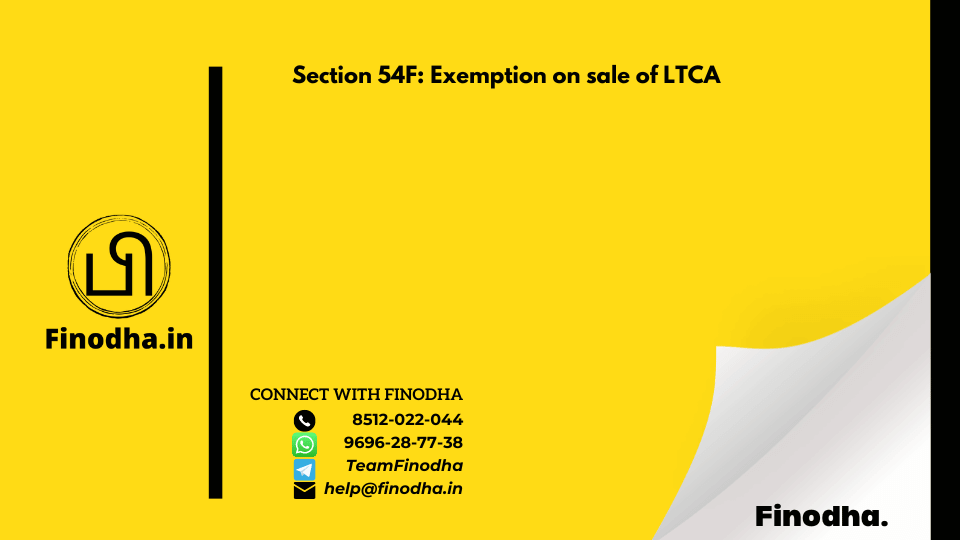Important Keyword: Capital Gain Exemption, Long Term Capital Asset, Section 54F.
Table of Contents
Section 54F: Exemption on sale of LTCA
Owning a residential house is a fundamental need for individuals, and the Government of India is dedicated to realizing the vision of “Housing for All.” In pursuit of this goal, the government has implemented several schemes aimed at making housing more affordable. Additionally, various tax exemptions have been introduced to facilitate these objectives. Section 54F stands out as one such provision offering relief for long-term capital gains.
Capital Gains investment under Section 54F
To avail of an exemption under Section 54F, certain eligibility criteria must be met. Firstly, the taxpayer should not own more than one house property on the date of transferring the original asset. Additionally, within specific timeframes following the transfer, the taxpayer should neither purchase nor construct any other house property, except for the new asset for which exemption is sought.
Other important considerations include:
- The taxpayer must be an individual (including NRIs) or a Hindu Undivided Family (HUF).
- The asset sold should be a long-term asset other than a house property.
- The new house property must be situated in India.
- The transfer must involve long-term capital assets other than residential houses.
Quantum of exemption under Section 54F
Under Section 54F, the amount of exemption is determined based on specific criteria:
- If the cost of the new residential house is equal to or greater than the net sale consideration of the original asset, the entire capital gain is exempt.
- If the cost of the new residential house is less than the net sale consideration of the original asset, only a proportionate amount of the capital gain is exempt. This is calculated as follows:
- Proportionate Exemption = Long Term Capital Gain * (Amount Invested in New Residential House / Net Sale Consideration)
For instance, consider Akash, who sold gold in FY 2022-23 for ₹16 crore, resulting in a net long-term capital gain of ₹12 crore. He subsequently invested ₹8 crore in a new residential house property. In this scenario, he can claim an exemption of ₹6 crore under Section 54F.
| Particulars | Amount (₹ in ‘000) |
| Net Sale Consideration | 160,000 |
| LTCG Computed | 120,000 |
| Cost of New Residential House | 80,000 |
| Exempt LTCG ( 6*(8/16)Cr.) | 60,000 |
Consequences of Transfer of New House Property
If the new asset is sold before three years from its purchase or construction date, any long-term capital gain previously exempted under section 54F will become taxable as capital gains. Additionally, any capital gain resulting from the sale of the new residential house property will also be subject to taxation under capital gains.
Consequences of Purchasing or Constructing Another House Property:
If the taxpayer acquires another residential house within two years or constructs one within three years from the date of the original asset’s transfer, the long-term capital gain that was previously exempted under Section 54F will be liable to tax in the year in which such residential house is purchased or constructed.
CGAS Scheme for claiming exemption under Section 54F of the Income Tax Act
Under Section 54F, taxpayers can leverage the Capital Gains Account Scheme (CGAS) to avail exemptions. If a taxpayer cannot utilize the entire or partial sales proceeds for purchasing or constructing a new house property by the due date of submitting their Income Tax Return (ITR), they should deposit the funds into the Capital Gains Deposit Account Scheme (CGAS). By doing so, taxpayers can claim an exemption for the amount already spent on property purchase or construction, along with the amount deposited in CGAS.
However, it’s crucial to understand that if the taxpayer fails to utilize the funds deposited in the Capital Gains Account Scheme within the stipulated three-year period, the deposited amount will be taxable as income for the last year.
Read More: Section 54EC of Income Tax Act
Web Stories: Section 54EC of Income Tax Act
Official Income Tax Return filing website: https://incometaxindia.gov.in/




